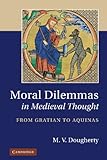Moral dilemmas in medieval thought [Texte imprimé] : from Gratian to Aquinas / M. V. Dougherty
نوع المادة : نصتفاصيل النشر:Cambridge ; New York ; Melbourne [etc.] : Cambridge University Press, 2011وصف:1 vol. (X-226 p.) ; 24 cmتدمك:
نصتفاصيل النشر:Cambridge ; New York ; Melbourne [etc.] : Cambridge University Press, 2011وصف:1 vol. (X-226 p.) ; 24 cmتدمك:- 978-1-107-00707-9
- 1-107-00707-0
- 170.940902 23E
- 170
| نوع المادة | المكتبة الحالية | رقم الطلب | رقم النسخة | حالة | تاريخ الإستحقاق | الباركود | |
|---|---|---|---|---|---|---|---|
|
|
Bibliothèque centrale En accès libre | 170 / 673 (إستعراض الرف(يفتح أدناه)) | 1 | المتاح | 000005993376 |
Browsing Bibliothèque centrale shelves, Shelving location: En accès libre إغلاق مستعرض الرف(يخفي مستعرض الرف)
Bibliogr. p. 204-220
Introduction -- 1. Gratian and his glossators on conflicts in the natural law -- 2. Twenty moral dilemmas from two early thirteenth-century summaries of theology: William of Auxerre's Summa aurea and the Franciscan Summa Halesiana -- 3. Raymond Lull and moral ensnarement in the Vita coaetanea -- 4. Thomas Aquinas, moral dilemmas, and a missing article from Quodlibet XII -- 5. Thomas Aquinas on failures of practical reasoning: why synderesis doesn't inoculate agents against malformed conscience dilemmas -- 6. Moral dilemmas in the early Thomistic tradition: Johannes Capreolus and the deceiving demon dilemma -- Conclusion
"The history of moral dilemma theory often ignores the medieval period, overlooking the sophisticated theorizing by several thinkers who debated the existence of moral dilemmas from 1150 to 1450. In this book Michael V. Dougherty offers a rich and fascinating overview of the debates which were pursued by medieval philosophers, theologians and canon lawyers, illustrating his discussion with a diverse range of examples of the moral dilemmas which they considered. He shows that much of what seems particular to twentieth-century moral theory was well-known long ago - especially the view of some medieval thinkers that some forms of wrongdoing are inescapable, and their emphasis on the principle 'choose the lesser of two evils'. His book will be valuable not only to advanced students and specialists of medieval thought, but also to those interested in the history of ethics."-- Provided by publisher
لا توجد تعليقات على هذا العنوان.















